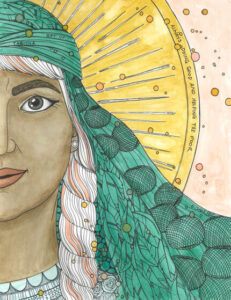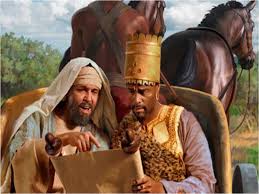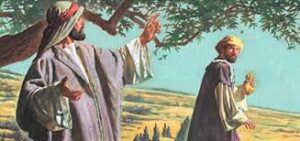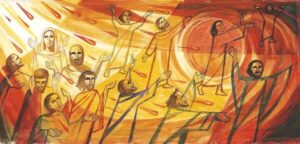Bh – Peter’s Report to Jerusalem 11: 1-18
Peter’s Report to Jerusalem
11: 1-18
42 AD
Peter’s report to Jerusalem DIG: Why might Luke have taken the time and space to record the events of 10:9-46 all over again? Of what importance is the gift of the Ruach ha-Kodesh in Peter’s argument? Why would this have such a strong effect on the Jerusalem believers? Why is it misunderstood (see 1:6)? Why do you think God chose Peter to be the first to go to the Gentiles? Why did they speak in tongues? How do you explain the change in attitudes from verse 2 to verse 18? How does this story relate to 1:18?
REFLECT: How might this principle affect how you treat “unacceptable” people you meet? How have you been criticized for breaking the religious traditions of your place of worship? Why did you do so? What did you feel was at stake? The lesson of 10:34-35 and 11:18 was not easily learned, even by Peter (Galatians 2:11-14). What might have happened if the early Messianic Community denied the new principle (10:15, 28 and 11:9) that ADONAI taught Peter?
Now while Peter was still ministering in Caesarea, word of the remarkable events that had taken place reached the Messianic community in Yerushalayim. The news of his interaction with the Gentiles had spread like wildfire. The apostles who had remained in Jerusalem after the persecution of the Hellenistic Jews (to see link click Ax – The Stoning of Stephen), and the Jewish believers in the Messianic Congregation throughout Judea heard that the Gentiles also had received the word of God (11:1).
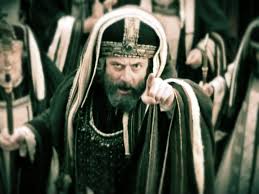
The charge: But when Peter returned to Jerusalem from his Judean ministry, those belonging to the sect of the Pharisees, those of the circumcision (15:5), took issue with him, saying scornfully: You went to uncircumcised men and ate with them (11:2-3)! It was as if they were saying, “You, who are supposed to be a faithful Jew, associated with, and even ate with Gentiles. How could you!” Centuries of Jewish practice made them critical of what Peter had been reported doing, especially his action with eating with the Gentiles. Even though the Gentiles had become converts, the problem still existed. If Jewish believers felt bound to the kosher eating regulations of the Torah, there could be no fellowship with Gentile believers (or Gentile unbelievers) unless the Gentiles were circumcised and kept kosher themselves. Therefore, those of the circumcision were zealots for the Torah (21:20) and insisted on the necessity of circumcision even for Gentiles. This was not only a matter of religion, but also of culture, and cultural norms are very hard to break. On this key issue they were not afraid to challenge Peter, the chief of the apostles. All this would come to a head later on (see Bs – The Counsel at Jerusalem).236
But Kefa (Peter) had nothing to fear. ADONAI chose him as His instrument to bring Yeshua to the Gentiles precisely because he was an observant Jew; in this way all would know that God’s hand was in it. Had a less Torah-observant Jew seen the vision, it would have been no less of YHVH, but those of the circumcision might have dismissed him as being self-serving, as much as people regarded Sha’ul, but for different reasons (Acts 21:21; Romans 3:8).237
The defense: Instead of entering into a heated rebuke of their prejudice, Peter began explaining to them what happened in a complete, detailed chronological order, point by point, saying: I was in the city of Joppa praying, and I saw a vision – something like a great sheet coming down, being lowered from heaven by its four corners, and it came right to me. I looked inside, considering it carefully, and saw four-footed kosher creatures of the earth, wild animals (non-kosher), reptiles (a mixture of kosher and non-kosher), and birds of the air (once again a mixture of kosher and non-kosher). I also heard a voice saying: Get up, Peter. Kill and eat (11:4-7).
But I said: Certainly not, Lord! For never has anything unclean, or treif, entered my mouth. But a voice from heaven answered a second time, “What God has made clean, you must not consider unholy.” This happened three times for emphasis, and then everything was pulled up to heaven (11:8-10). At first, Peter thought God was speaking about food. He came to understand, however, that the vision of the sheet and kosher and non kosher animals had to do with people, not food.
At that very moment, three men arrived at the house where we were, sent to me from Caesarea. The Ruach told me to go with them without hesitating. These six Jewish brothers (who were standing there with him) also went with me, and we entered the man’s house. Peter admitted that he entered the house of a Gentile, but his defense is that it was not the wrong thing to do. He reported to us how he had seen an angel standing in his house and saying: Send to Joppa and bring Simon called Peter. So both men received a divine invitation. He will speak words to you by which you will be saved – you and all your household (11:11-14). Therefore, Peter’s point was that the Ruach ha-Kodesh told him to go.
Then Peter states the most important part of his defense: As I began to speak, the Ruach ha-Kodesh fell on them (Gentiles) and they began to speak in tongues (languages), just as on us (Jews) at the beginning at Shavu’ot (see Al – The Ruach ha-Kodesh Comes at Shavu’ot). And I remembered the word of the Lord, how He used to say: John immersed with water, but you will be immersed in the Ruach ha-Kodesh (11:15-16). God’s stamp of approval was on this ministry to the Gentiles.
Then he wrapped up his defense with a summary: Therefore, if God gave them the same gift of the Ruach ha-Kodesh as also to us after we put our trust in the Lord Messiah Yeshua, who was I to stand in God’s way (11:17)? The answer was obvious. Peter could do nothing else than what he did in light of ADONAI’s commands to him. The miraculous phenomena signaling the arrival of the Spirit of God, corroborating testimony by unsympathetic but trustworthy witnesses, and the promise of Scripture spoken by the Lord Himself was enough evidence to silence the protests.238
The verdict: Just as Peter had been convinced of the evidence, so now were the Jews in Jerusalem. Shocked as they were, the council members could not deny what had happened. Even those belonging to the sect of the Pharisees had nothing to say. Their reaction was stunned silence. When they heard these things they became quiet. However, silence quickly gave way to praise, and even the Pharisees who had become believers glorified God, saying: Then even to the Gentiles God has granted repentance leading to life (11:18)! They were now full members of the Church, therefore, circumcision and being Torah observant were unnecessary for salvation. The Church was one – Jew and Gentile (Galatians 3:28; Ephesians 2:14-18).
The Gentile issue was not yet fully resolved, the debate had just been suspended, and the criticism temporarily silenced until Acts 15. Even Peter would later vacillate and withdraw from eating with Gentiles at Antioch under pressure from the Judaizers (Galatians 2:11-14). Nevertheless, the door had been opened to the Gentiles for salvation and Luke is prepared to recount how an opportunistic and zealous evangelist (Paul), with another trustworthy brother (Barnabas), under the guidance and commissioning of a congregation that already involved both Jews and Gentiles (Antioch), was going to seize the moment and begin the first efforts to evangelize the Gentile nations. Surprisingly, it would not be an initiative undertaken by the Jerusalem community itself.239
As believers, we are to receive one another and not argue over cultural differences or minor matters of personal conviction (Romans 14 and 15). Some of the Jewish believers in the early Messianic community wanted the Gentiles to become Jews, and some of the Gentile believers wanted the Jews to stop being Jews and become Gentiles! This attitude can create serious division in the Church even today, so it is important that we follow the example of Acts 11:18 and accept the one who is weak in faith, but not for the purpose of disputes about opinions (Romans 14:1). We must receive those whom ADONAI has also received.240
These events were happening for specific reasons in this period of historical transition. The Gentiles received the Ruach ha-Kodesh at the time of conversion. They spoke in tongues (languages) at the moment they were saved, as proof to everyone that they were then part of the Church. The norm is salvation and the reception of the Ruach at the same time. Peter was present, and therefore he could report to the Jewish members of the Jerusalem counsel that the Gentiles were true believers. At the same time, the Gentiles would recognize the authority of the apostles because Peter had been with them and had led them to Messiah. Most importantantly, both groups knew that they had the same Ruach and were part of the same body.241
This was the beginning of the divine effort to lay the groundwork for the first Gentile church. About twelve years had passed from Shavu’ot to the founding of that church at Antioch (see Bj – The Church in Antioch). There were several reasons for that delay. First, apostolic authority had to be established. It took time for the believers to become grounded in the apostles’ teaching (2:42), and for the development of leaders. During those years, the apostles laid the doctrinal of the church. Second, individual believers needed to be brought to a sufficient level of maturity before they could be sent out. Immature believers would not make effective missionaries. Third, it took time to tear down the long-established walls of prejudice. That was starting to be achieved (Galatians 2:11-14), so the time was right to give birth to a church in a Gentile land and to move to the last phase of ADONAI’s plan for evangelism – to the end of the earth (Acts 1:8).242
The observant Jews in the Messianic Community were amazed that Gentiles could become part of God’s people, part of the Body of Messiah, without first becoming Jews. But today the situation is exactly the opposite; many Gentile Christians are amazed at a movement of Messianic Jews that claims Jews can accept the Jewish Messiah, Yeshua, without taking on the lifestyle of Gentiles. The more things change, the more they stay the same.243



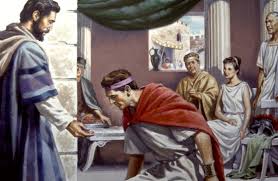

 Porque han entrado disimuladamente ciertos hombres impíos (destinados desde antiguo para este juicio), los cuales convierten en lascivia la gracia de nuestro Dios, y niegan a Jesús el Mesías, nuestro único Soberano y Señor (Judas 4).
Porque han entrado disimuladamente ciertos hombres impíos (destinados desde antiguo para este juicio), los cuales convierten en lascivia la gracia de nuestro Dios, y niegan a Jesús el Mesías, nuestro único Soberano y Señor (Judas 4).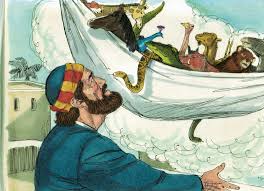
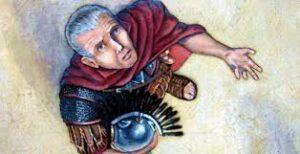
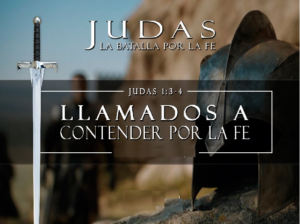 Judas comienza a explicar su propósito original. A los amados de Dios (3a). Al usar la palabra amado es tanto él, como otros, comienzan una nueva sección. Al llamarlos amados de Dios, él no solo señala el comienzo de una nueva sección, sino que señala el hecho de que son creyentes. Amado es agapetoi, un adjetivo plural, que significa amados, que son seres queridos divinamente, amados por ADONAI. La Palabra de Dios es para el pueblo de Dios. Tendrá poco significado para aquellos que no han nacido en su familia, pero un hombre natural no acepta las cosas del Espíritu de Dios (Ruaj HaKodesh), porque para él son necedad, y no puede entenderlas porque se han de discernir espiritualmente (1 Corintios 2:14).
Judas comienza a explicar su propósito original. A los amados de Dios (3a). Al usar la palabra amado es tanto él, como otros, comienzan una nueva sección. Al llamarlos amados de Dios, él no solo señala el comienzo de una nueva sección, sino que señala el hecho de que son creyentes. Amado es agapetoi, un adjetivo plural, que significa amados, que son seres queridos divinamente, amados por ADONAI. La Palabra de Dios es para el pueblo de Dios. Tendrá poco significado para aquellos que no han nacido en su familia, pero un hombre natural no acepta las cosas del Espíritu de Dios (Ruaj HaKodesh), porque para él son necedad, y no puede entenderlas porque se han de discernir espiritualmente (1 Corintios 2:14). El peligro de los apóstatas. La advertencia de Salomón: compra la verdad y no la vendas (Proverbios 23:23a) señala el hecho de que la verdad es un bien extremadamente valioso en la Biblia. Después de todo, ADONAI es el Dios de verdad (Salmo 31:5; Isaías 65:16), habiendo magnificado su Palabra, que es
El peligro de los apóstatas. La advertencia de Salomón: compra la verdad y no la vendas (Proverbios 23:23a) señala el hecho de que la verdad es un bien extremadamente valioso en la Biblia. Después de todo, ADONAI es el Dios de verdad (Salmo 31:5; Isaías 65:16), habiendo magnificado su Palabra, que es  Judas, un siervo de Jesús el Mesías (Judas 1a). Él no se llama a sí mismo un apóstol, como lo hicieron Pablo y Pedro en sus presentaciones. Un siervo de Jesús (Yeshua) el Mesías, probablemente no pretende transmitir que Judas era un esclavo en el sentido de que todos los creyentes son siervos de Cristo, sino en ese sentido especial en el que aquellos estaban atados a Su servicio, estaban empleados en la predicación y difusión de Su palabra.9
Judas, un siervo de Jesús el Mesías (Judas 1a). Él no se llama a sí mismo un apóstol, como lo hicieron Pablo y Pedro en sus presentaciones. Un siervo de Jesús (Yeshua) el Mesías, probablemente no pretende transmitir que Judas era un esclavo en el sentido de que todos los creyentes son siervos de Cristo, sino en ese sentido especial en el que aquellos estaban atados a Su servicio, estaban empleados en la predicación y difusión de Su palabra.9 Judas
Judas
